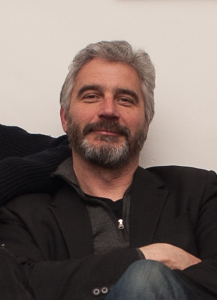Believing and Belonging
| Date: | 23 April 2014 |
| Author: | Religion Factor |

Next week, Professor Simon Glendinning from the London School of Economics will give a talk on “Derrida and the Question of Religion Today” as part of the Centre for Religion, Conflict and the Public Domain Seminar Series. In today’s post, he gives us an insight to his research exploring the different ways in which people believe and belong (or not) in contemporary European society.
My recent work on religious belief in Europe has focused on something of a puzzle thrown up by social surveys of belief and non-belief. These surveys seem to show that a sizeable majority of the population do not, when asked, affirm either of the positions that would normally be regarded as the standard ones: of being an avowed theistic believer committed to a religious creed (only 19% in a recent survey of Western Europeans), or of being an avowed atheistic non-believer in God or any gods (only 13.5% in the same survey). Excluding “agnostics” and “don’t knows”, a striking 42% of those asked do not fall into either of these two supposedly basic groups. Neither theistic believers nor atheistic non-believers. Who are they? What are they?!
The first thing I wanted to acknowledge when I tried to come to terms with this situation, was that, when asked whether they believe in a God who can hear our prayers, this motley majority say: “No”. But they do not self-identify as atheists either. This odd combination reminded me of a brief and difficult text on religious belief by Ludwig Wittgenstein (transcribed from student lecture notes), and re-reading it made me think that his ideas provided a sort of key for re-thinking belief and non-belief in our time beyond the theist/atheist opposition – providing, in fact, a self-understanding of sorts for those unsatisfied with either of the standard positions.
Wittgenstein did not have religious beliefs, but he felt very strongly, if somewhat obscurely, that when it came to his relations with people who do cleave to religious beliefs he was not – at least not always and at every moment – in a space of conflicting beliefs. For example, regarding someone who believes in the Last Judgment, and by this he meant someone whose life was run through with this belief so that “whenever he does anything, this is before his mind,” Wittgenstein says this:
If someone said: “Wittgenstein do you believe in this? I’d say “No.” “Do you contradict this man?” I’d say: “No.”… If he said “there is a German aeroplane overhead,” and I said “Possibly. I’m not so sure,” you’d say we were fairly near. [But with religious belief] it isn’t a question of my being anywhere near him, but on an entirely different plane… If you ask me whether or not I believe in a Judgment Day in the sense in which religious people have belief in it, I wouldn’t say “No. I don’t believe there will be such a thing.” It would seem to me utterly crazy to say this.
Wittgenstein goes on to accept that you can say of him that he “believes the opposite” of the religious believer, but it is, he insists, “entirely different from what we would ordinarily call believing the opposite.” It is not about having the opposite thoughts, but of having different sorts of thoughts altogether and of typically having no thoughts at all concerning what is to the fore in the believer’s life. Wittgenstein said of himself that he is “not a religious man”, but it is quite wrong to confuse him with a standard atheist. He was, I think, writing and thinking in an a-theist condition very different from the standard one, cultivating a new culture of a-theism for our time.
There is a sequence of remarks in Wittgenstein’s presentation of little scenes of “believing the opposite without believing the opposite” or “contradiction without contradiction” where the contrast between Wittgenstein’s own relation to religious belief and that of the standard atheist is developed in a fascinating way. However, the published notes forming this sequence are, for reasons I will come to, particularly hard to read, and have never been explored before. I will try to follow them here.
As we have just seen, Wittgenstein presents himself as being asked by another: “Wittgenstein, what do you believe? What do you think? What would you say?” He then presents himself as giving his own answer, or imagines trying to give his own answer. So we are given a believer’s belief and Wittgenstein imagines being asked if he would say he believes the same or not. And he says that, in the sense in which a believer believes, it would be crazy to say he held a view which contradicts it. His beliefs and the beliefs of the believer are, he says, on an “entirely different plane.”
However, once, just once, in the transcribed discussion he speaks not of “Wittgenstein” and his own response to a believer, but about what “an atheist” might say. The sentence in the published text is both sketchy and (it would seem) poorly typeset. It runs as follows: “If an atheist says: ‘there won’t be a Judgment Day, and another person says there will,’ do they mean the same? – not clear what criterion of meaning the same is.”
There really is no clearly expressed thought transcribed here. Indeed, there seem to be two distinct but equally plausible ways of rendering the notes into good sentences. First, we could read it as an illustration of the basic scene of contradiction and its complexity, with Wittgenstein here replacing himself with “an atheist,” as one might well suppose he might. We could then read it like this:
Suppose an atheist says: “There won’t be a Judgment Day,” and another person says: “There will be a Judgment Day.” Should we say that these two people mean the same by “Judgment Day”? The question is not so simple because it is not clear what criterion of “meaning the same” is in play here.
This seems natural enough, but one can also give the lecture notes a slightly different reading, preserving the unusual punctuation, one which situates the remark as belonging to a critical reading of a modern atheist interpretation of the scene of contradiction:
An atheist might say: “There won’t be a Judgment Day, but another person says there will.” Should we see it like this? Should we suppose that we can line up the beliefs like this, as the atheist supposes, can we put them side-by-side like this, one affirming and the other denying the same thing? Can we affirm that the two mean the same? What criterion of “meaning the same” would speak for this?
The text continues: “They might describe the same things. You might say this already shows that they mean the same thing.” But this continuation can also be read in two ways, in line with the two former renditions:
There is a criterion of meaning that would seem to settle this question conclusively: namely, if they describe the same things when they are asked what Judgment Day is. If they both describe the same things this shows they mean the same.
Or, alternatively – it continues to elaborate and explore a standard atheist conception:
The atheist is sure they do mean the same. He says that they might describe the same things and that this is the criterion for them meaning the same thing. He says that if they do describe the same things, then this settles the matter: they mean the same.
Given Wittgenstein’s insistence that he does not contradict the believer, I strongly favour reading these notes as giving a probing reading of a standard atheist interpretation of the scene of contradiction. Moreover, the remarks that follow seem clearly intended to show that the conviction that we should say they “mean the same” in the scene of contradiction is a characteristically atheist interpretation, and that Wittgenstein rejects it. For Wittgenstein goes on to insist that at issue here are not two contradictory sentences but, roughly speaking, two different cultures: “What belongs to a language-game is a whole culture.”
And Wittgenstein? He is not remotely skeptical about the achievements of natural science, but he is not remotely close to being a standard atheist. On the contrary, he seems rather more to belong without belonging to the culture of religious faith. Although not a religious man, Wittgenstein took the religious point of view extremely seriously. One might even say that he believed without believing in the God of religious faith.
Let’s go back to the puzzle concerning the social surveys. My thought is that if we take the idea of existing in an a-theist condition seriously we can start to make headway with this. Grace Davie has famously written about “believing without belonging” and also about “belonging without believing” to characterise many people in our societies, and she certainly has struck a chord with this idea. But I think we need now to acknowledge a new category, or perhaps two new categories. The position that Davies’ variants deviate from is the traditional one: “believing and belonging”. Perhaps today we can add a paradoxical supplementary pair: “believing without believing” and “belonging without belonging” Is that you?

Simon Glendinning is Professor of European Philosophy in the European Institute at the London School of Economics and Political Science, and is a Fellow of the Centre for Religion, Conflict and the Public Domain at the University of Groningen. His background is in European Philosophy but his current research engages with the Philosophy of Europe, exploring Europe’s philosophical, political and cultural identity and heritage.

